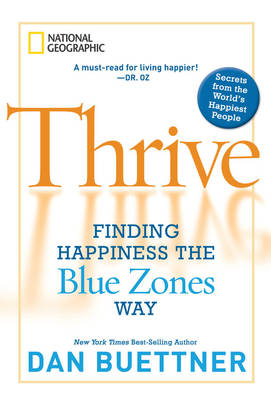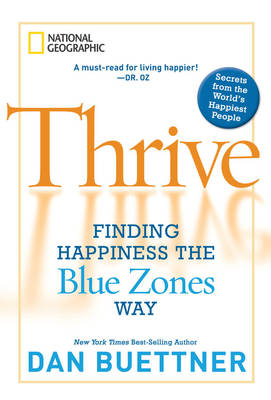
- Afhalen na 1 uur in een winkel met voorraad
- Gratis thuislevering in België vanaf € 30
- Ruim aanbod met 7 miljoen producten
- Afhalen na 1 uur in een winkel met voorraad
- Gratis thuislevering in België vanaf € 30
- Ruim aanbod met 7 miljoen producten
Zoeken
€ 36,45
+ 72 punten
Uitvoering
Omschrijving
What makes us happy? It's not wealth, youth, beauty, or intelligence, says Dan Buettner. In fact, most of us have the keys within our grasp. Circling the globe to study the world's happiest populations, Buettner has spotted several common principles that can unlock the doors to true contentment with our lives. Working with leading researchers, Buettner identifies the happiest region on each of four continents. He explores why these populations say they are happier than anyone else, and what they can teach the rest of us about finding contentment. His conclusions debunk some commonly believed myths: Are people who have children happier than those who don't? Not necessarily--in Western societies, parenthood actually makes the happiness level drop. Is gender equality a factor? Are the world's happiest places to be found on tropical islands with beautiful beaches? You may be surprised at what Buettner's research indicates. Unraveling the story of each hotspot like a good mystery, Buettner reveals how he discovered each location and then travels to meet folks who embody each particular brand of happiness. He introduces content, thriving people in Denmark, in Singapore, in northeastern Mexico, and in a composite happiest place in America. In addition, he interviews economists, psychologists, sociologists, politicians, writers, and other experts to get at what contributes to each region's happiness, from the Danish concept of hygge, which translates to creating a feeling of coziness, to the Mexican love of a good joke. Buettner's findings result in a credible, cross-cultural formula and a practical plan to help us stack the deck for happiness and get more satisfaction out of life. According to Buettner's advisory team, the average person can control about forty percent of his or her individual happiness by optimizing life choices. These aren't unreasonable demands on a person's lifestyle, and they often require only slight changes. They fall into three categories that make up the way we live our lives: the food we eat, the way we exercise, and the social networks we foster. It's all about nourishing the body and the spirit. Heeding the secrets of the world's happiness all-stars can help us make the right choices to find more contentment in our own lives and learn how to thrive.
Specificaties
Betrokkenen
- Auteur(s):
- Uitgeverij:
Inhoud
- Aantal bladzijden:
- 304
- Taal:
- Engels
Eigenschappen
- Productcode (EAN):
- 9781426205156
- Verschijningsdatum:
- 19/10/2010
- Uitvoering:
- Hardcover
- Formaat:
- Genaaid
- Afmetingen:
- 155 mm x 245 mm
- Gewicht:
- 498 g

Alleen bij Standaard Boekhandel
+ 72 punten op je klantenkaart van Standaard Boekhandel
Beoordelingen
We publiceren alleen reviews die voldoen aan de voorwaarden voor reviews. Bekijk onze voorwaarden voor reviews.











